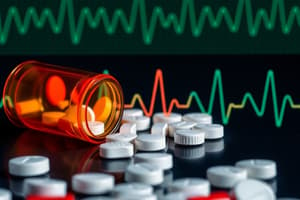Podcast
Questions and Answers
What is the primary monitoring requirement for patients on Warfarin?
What is the primary monitoring requirement for patients on Warfarin?
- Monitoring for signs of heart failure
- Monitoring INR/PT (correct)
- Monitoring PTT
- Monitoring blood glucose levels
Which symptom is not typically associated with Myocardial Infarction?
Which symptom is not typically associated with Myocardial Infarction?
- Diaphoresis
- Chest pain
- Shortness of breath
- Delayed wound healing (correct)
Which medication is commonly used post-MI or stent placement?
Which medication is commonly used post-MI or stent placement?
- Heparin
- Vitamin K
- Warfarin
- Clopidogrel (correct)
Which clinical intervention is most appropriate for patients with Deep Vein Thrombosis (DVT)?
Which clinical intervention is most appropriate for patients with Deep Vein Thrombosis (DVT)?
What is the antidote for Warfarin overdose?
What is the antidote for Warfarin overdose?
Which of the following signs would indicate Hypoglycemia?
Which of the following signs would indicate Hypoglycemia?
What is the normal range for PT (Prothrombin Time)?
What is the normal range for PT (Prothrombin Time)?
Which symptom is characteristic of Peripheral Artery Disease?
Which symptom is characteristic of Peripheral Artery Disease?
Flashcards
Aspirin's Role
Aspirin's Role
An antiplatelet medication used to prevent stroke and heart attack.
Warfarin's Action
Warfarin's Action
An anticoagulant that prevents blood clots, requires monitoring.
Heparin's Use
Heparin's Use
Anticoagulant, monitors PTT, uses protamine as antidote.
Clopidogrel's Function
Clopidogrel's Function
Signup and view all the flashcards
Vitamin K's Role in Warfarin
Vitamin K's Role in Warfarin
Signup and view all the flashcards
Prothrombin Time (PT)
Prothrombin Time (PT)
Signup and view all the flashcards
Partial Thromboplastin Time (PTT)
Partial Thromboplastin Time (PTT)
Signup and view all the flashcards
HbA1c
HbA1c
Signup and view all the flashcards
Study Notes
Aspirin, Warfarin, Heparin, Clopidogrel, Vitamin K
- Aspirin: Antiplatelet; reduces stroke and MI risk; monitor for bleeding.
- Warfarin: Anticoagulant; INR and PT monitoring; dietary vitamin K consistency; protamine sulfate is the antidote.
- Heparin: Anticoagulant; PTT monitoring; protamine sulfate is the antidote.
- Clopidogrel: Antiplatelet; used after MI or stent placement; monitor for bleeding.
- Vitamin K: Antidote for warfarin overdose; affects clotting factor synthesis.
PT, PTT
- PT (Prothrombin Time): Measures extrinsic clotting pathway; normal range 11-13.5 seconds.
- PTT (Partial Thromboplastin Time): Measures intrinsic clotting pathway; normal range 25-35 seconds.
Cardiovascular Disease
- Symptoms (S/S): Chest pain, dyspnea, fatigue, palpitations.
- Interventions: Lifestyle changes, medications (e.g., statins, antihypertensives), possible procedures (angioplasty, CABG).
Peripheral Artery Disease
- S/S: Intermittent claudication, cold limbs, delayed wound healing.
- Interventions: Smoking cessation, exercise, medications (antiplatelets), and surgery (angioplasty).
Myocardial Infarction
- S/S: Chest pain, shortness of breath, diaphoresis, nausea.
- Interventions: MONA (Morphine, Oxygen, Nitrates, Aspirin), thrombolytics, and cardiac catheterization.
Deep Vein Thrombosis
- S/S: Swelling, redness, pain in affected limb.
- Interventions: Anticoagulants (e.g., heparin, warfarin), compression stockings, and mobility.
Pulmonary Embolism
- S/S: Sudden dyspnea, chest pain, tachycardia, hemoptysis.
- Risks: Immobility, DVT, surgery, smoking.
Diabetes Type 2 (Hypoglycemia/Hyperglycemia)
- Symptoms (S/S): Hypoglycemia: Sweating, confusion, tachycardia; Hyperglycemia: Polyuria, polydipsia, polyphagia.
- Interventions: Monitor glucose, administer insulin or oral hypoglycemics, dietary management.
- Glucose Levels: Normal 70-110 mg/dL (fasting).
- HbA1C: Reflects 3-month glucose average; normal <5.7%, diabetic >6.5%.
Chronic Obstructive Pulmonary Disease (COPD)
- S/S: Chronic cough, sputum production, dyspnea.
- Interventions: Smoking cessation, bronchodilators, corticosteroids, and oxygen therapy.
Atrial Fibrillation
- S/S: Irregular heartbeat, palpitations, fatigue.
- Interventions: Anticoagulants, rate/rhythm control (beta-blockers, amiodarone).
Troponin
- Cardiac biomarker; elevated levels indicate myocardial damage (Normal: <0.04 ng/mL).
Cardiac Catheterization
- Pre-procedure: NPO, informed consent, baseline vitals.
- Post-procedure: Monitor puncture site, vitals, and for complications (bleeding, arrhythmias).
4Gs (Garlic, Ginger, Ginseng, Ginkgo)
- Affect coagulation; caution with anticoagulants; monitor for bleeding risks.
Medications (Nitroglycerin, Prednisone, Metformin)
- Nitroglycerin: For angina; monitor for hypotension, headaches.
- Prednisone: Corticosteroid; monitor glucose, infection risk.
- Metformin: For Type 2 diabetes; monitor renal function, lactic acidosis risk.
Ibuprofen, Ondansetron (Zofran)
- Ibuprofen: NSAID; monitor for GI upset, kidney function.
- Ondansetron: Antiemetic; monitor for QT prolongation, constipation.
Blood Transfusions
- Reactions: Hemolytic (fever, back pain), Allergic (rash), Febrile (fever, chills).
- Interventions: Stop transfusion, notify provider, monitor vitals.
Electrolytes (K, Na)
- Potassium (K): 3.5-5.0 mEq/L; monitor cardiac function.
- Sodium (Na): 135-145 mEq/L; monitor neuro status.
Low Platelets
- S/S: Easy bruising, bleeding, petechiae.
- Interventions: Avoid NSAIDs, monitor CBC, platelet transfusions.
NSAIDs (Medication Teaching)
- Educate on GI risks; kidney function monitoring; and avoiding overuse.
Indwelling Urinary Catheters
- Monitor for infection; maintain sterility; regular cleaning.
15g/15 Rule / Hypoglycemic Protocol
- Treat hypoglycemia: 15g fast-acting carbs, recheck glucose in 15 minutes.
Simvastatin, Colace (Docusate)
- Simvastatin: Lowers cholesterol; monitor liver enzymes, muscle pain.
- Colace: Stool softener; used for constipation prevention.
Studying That Suits You
Use AI to generate personalized quizzes and flashcards to suit your learning preferences.




